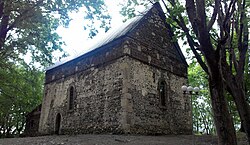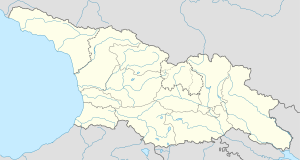Rhodopolis
|
Vartsikhe ვარციხე |
|
|---|---|
| Village | |

A 17th-century church in Vartsikhe
|
|
| Location of Vartsikhe | |
| Coordinates: 42°08′38″N 42°43′04″E / 42.14389°N 42.71778°ECoordinates: 42°08′38″N 42°43′04″E / 42.14389°N 42.71778°E | |
| Country |
|
| Region | Imereti |
| Municipality |
|
| Elevation | 80 m (260 ft) |
| Population (2014) | |
| • Total | 1,559 |
Vartsikhe (Georgian: ვარციხე) is a village in the Baghdati Municipality, Imereti, Georgia. It is located in western part of the country, in the Imereti Lowlands, at the confluence of the Rioni and Khanitskali rivers, some 17 km northwest of the town of Baghdati. Its population as of the 2014 census was 1,559.
Vartsikhe, formerly Vardtsikhe, is the Rhodopolis of the Eastern Roman authors of Late Antiquity. Rhodopolis was one of the key towns in Lazica, contested between the Eastern Roman and Sasanian empires in the 6th century. From the late 15th century into the early 19th, Vardtsikhe functioned as one of the castles of the kings of Imereti.
Vartsikhe was home to a fortified settlement, which dates back to the 4th century, as suggested by archaeological evidence. The Georgian name of the village, literally meaning "a fort of the rose", replicates the Greek placename Rhodopolis, "a city of the rose", recorded by the 6th-century Eastern Roman authors such as Procopius and Agathias.
Rhodopolis stood in a fertile and economically advantageous part of Lazica, on the road to its eastern neighbor, Iberia, but the location of the city in an open plain was militarily weak. Therefore, the Lazi, in fear of an invasion by the Sasanian Persian forces, destroyed the fortress of Rhodopolis as incapable of defense in the 530s. During the Lazic War (541–562), the Persian commander Mihr-Mihroe occupied the city and left a garrison in it. In 557, a force of 2,000 cavalrymen placed by the Eastern Roman general Justin under command of a Hun named Elminzur entered Rhodopolis unopposed as both the Persian garrison and locals were outside of the city walls. The Persian detachments were found and destroyed in the neighborhood; the local population were spared, but they had to furnish hostages to prove their loyalty.
...
Wikipedia

